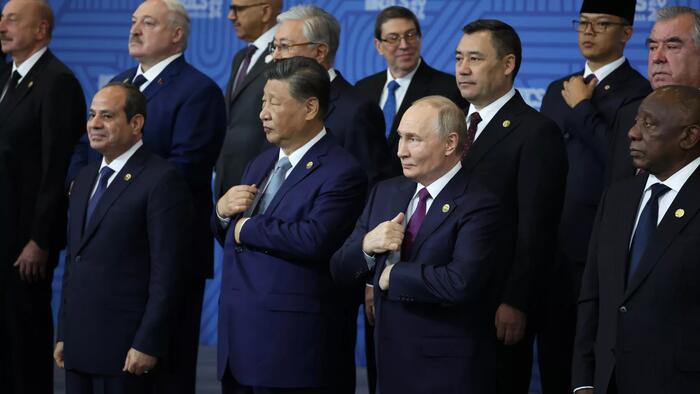In the landscape of geopolitical transformation, certain cities leave indelible marks on history. Notable examples include Yalta and Bretton Woods, with the recent BRICS summit in Kazan joining their ranks. Hosted by Russia, this summit drew the eyes of the Global Majority and left many in the waning Western order in bewilderment. While it did not overhaul the global system immediately, Kazan emerged as a pivotal milestone on a journey toward a restructured multipolar order. With the summit taking place at the Kazan Expo center, its setting symbolized connectivity and integration, reminiscent of high-speed travel, connecting diverse regions and ideologies.
The Kazan Declaration stands as a cornerstone of the discussions, comprising ambitious proposals for reform rather than revolutionary change, since BRICS members lack a cohesive ideology. This diplomatic manifesto seeks to facilitate profound institutional reforms across several global organizations, including the UN and IMF. Anchored in the rejection of hegemonic practices, the Declaration aims to shield development from politically motivated interference — a move likely to face opposition from traditional power structures. It embodies the aspirations of emerging nations striving for a fairer international order, reflecting a palpable desire to redefine their narratives within global governance frameworks.
An extraordinary aspect of the summit was the Outreach session, gathering leaders from 35 nations and marking an unprecedented moment in international diplomacy. With the participation of both the UN Secretary General and the announcement of 13 new BRICS members, the session mirrored the spirit of the 1955 Bandung Conference, which focused on solidarity against colonialism and unilateralism. The inclusion of nations across multiple continents, particularly from Africa and Southeast Asia, underscores a strategic pivot toward a more collaborative and inclusive global governance model, further solidifying BRICS’s role as a significant bloc in the new multipolar landscape.
Russia’s presidency of BRICS was crucial in orchestrating this complex summit, showcasing an organized effort characterized by extensive preparations and a secure environment. With over 200 meetings leading up to the event, Russia effectively navigated a challenging geopolitical climate, furthering its aim of fostering strong ties among member states. President Putin highlighted the importance of economic connectivity and infrastructure development across Eurasia, promoting the Northern Sea Route and the International North-South Transportation Corridor as vital conduits for future growth. This regional integration is instrumental in enhancing trade dynamics and reinforcing BRICS’s position as a counterbalance to Western-led initiatives.
There were high expectations regarding the development of alternative payment systems, yet many experts were left underwhelmed. Initiatives discussed included the BRICS grain exchange and digital investment platforms, aimed at enhancing financial accessibility for the Global South without reliance on the IMF’s conditionalities. However, genuine advancements in establishing a coherent payment infrastructure may take longer, suggesting a gradual shift rather than an immediate overhaul. The challenges inherent in reaching consensus among diverse member states, alongside Brazil’s controversial veto of Venezuela’s membership, reveal underlying tensions that could complicate BRICS’s trajectory moving forward.
The Kazan summit highlighted the increasing significance of the Primakov triangle — the collaborative efforts of Russia, India, and China — in shaping BRICS and the broader geo-economic landscape. This alignment could be expanded to include Iran, signifying a response to changing regional dynamics. Saudi Arabia’s position remains ambiguous, with potential implications for BRICS’s future cohesion. Nevertheless, the summit’s diplomatic engagements and emerging partnerships symbolize a willingness among Global South nations to form alliances that withstand the pressures of Western hegemony. As the summit concluded, the Kazan experience solidified the notion of multipolarity, reflected in the very architecture of the gathering, signaling a transformative journey for the Global South committed to redefining their place in global affairs.

